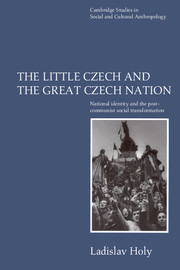 The Little Czech and the Great Czech Nation
The Little Czech and the Great Czech Nation Book contents
- Frontmatter
- Contents
- Acknowledgements
- Introduction
- 1 Nation against state
- 2 Freedom, nation, and personhood
- 3 Self-stereotypes and national traditions
- 4 National traditions and the imagining of the nation
- 5 National traditions and the political process
- 6 Nation and state in the context of Czech culture
- Notes
- References
- Index
3 - Self-stereotypes and national traditions
Published online by Cambridge University Press: 05 June 2012
- Frontmatter
- Contents
- Acknowledgements
- Introduction
- 1 Nation against state
- 2 Freedom, nation, and personhood
- 3 Self-stereotypes and national traditions
- 4 National traditions and the imagining of the nation
- 5 National traditions and the political process
- 6 Nation and state in the context of Czech culture
- Notes
- References
- Index
Summary
The most obvious expression of the search for the essence of national identity is the images people have of themselves and of other nations. When reflecting on themselves as a nation, Czechs refer either to certain national qualities or dispositions or to what they consider to be their national traditions. The self-images expressed through the characteristics which they ascribe to themselves and through the traditions which they claim as their own differ considerably. This raises the questions of why this should be so and how it can be cognitively tolerated and managed.
The ultimate source of the Czech egalitarian ethos is the belief in the equality of individuals in nature. It is acceptable to ascribe an individual's failure to a lack of effort or hard work but bad form to ascribe it to a lack of intelligence, for this would amount to the admission of inherent inequality, which is culturally denied. We may not all be good at everything, but each of us is good at something, which proves our natural equality. I do not think that anyone was sorry when IQ tests disappeared in communist Czechoslovakia, having been declared an invention of bourgeois pseudo-science; the illusion of equality in nature could thereafter be maintained without being openly challenged.
The little Czech as the typical representative of the Czech nation is the embodiment of ordinariness and healthy common sense. Whatever else he may lack, he does not lack intelligence.
- Type
- Chapter
- Information
- The Little Czech and the Great Czech NationNational Identity and the Post-Communist Social Transformation, pp. 72 - 113Publisher: Cambridge University PressPrint publication year: 1996
